Introduction to Economics: UK Labour Market and Immigration's Effects
VerifiedAdded on 2023/01/11
|12
|2570
|61
Essay
AI Summary
This essay delves into the multifaceted impact of immigration on the UK labour market, a topic of significant debate among economists. It begins with an introduction to micro and macroeconomics, setting the stage for an analysis of how immigration affects various aspects of the UK economy. The essay examines the influence of immigration on the supply and demand for labor, focusing on the skills of immigrants, the skills of existing workers, and the characteristics of the host economy. It explores both the positive and negative consequences, including the potential for increased competition, wage adjustments, and changes in employment levels. The essay also considers the impact of immigration on GDP, government spending, and the overall economic well-being of the UK. The analysis includes a discussion of the Brexit vote and its relationship to concerns about labour migration. The conclusion summarizes the findings, emphasizing that while immigration offers economic benefits, it also presents political and social challenges, requiring careful consideration of its effects on the UK's economy.

Micro macro economic
Paraphrase This Document
Need a fresh take? Get an instant paraphrase of this document with our AI Paraphraser
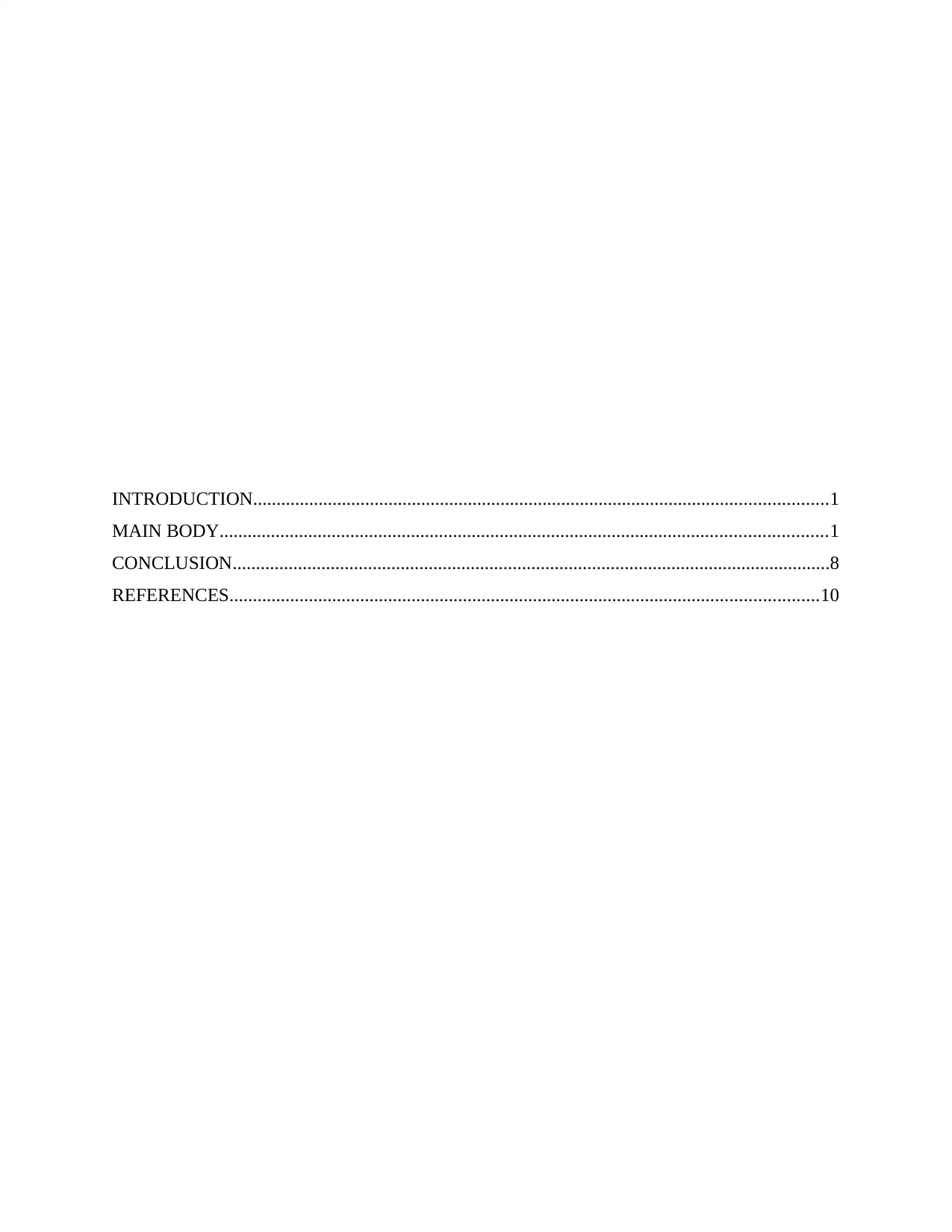
INTRODUCTION...........................................................................................................................1
MAIN BODY..................................................................................................................................1
CONCLUSION................................................................................................................................8
REFERENCES..............................................................................................................................10
MAIN BODY..................................................................................................................................1
CONCLUSION................................................................................................................................8
REFERENCES..............................................................................................................................10
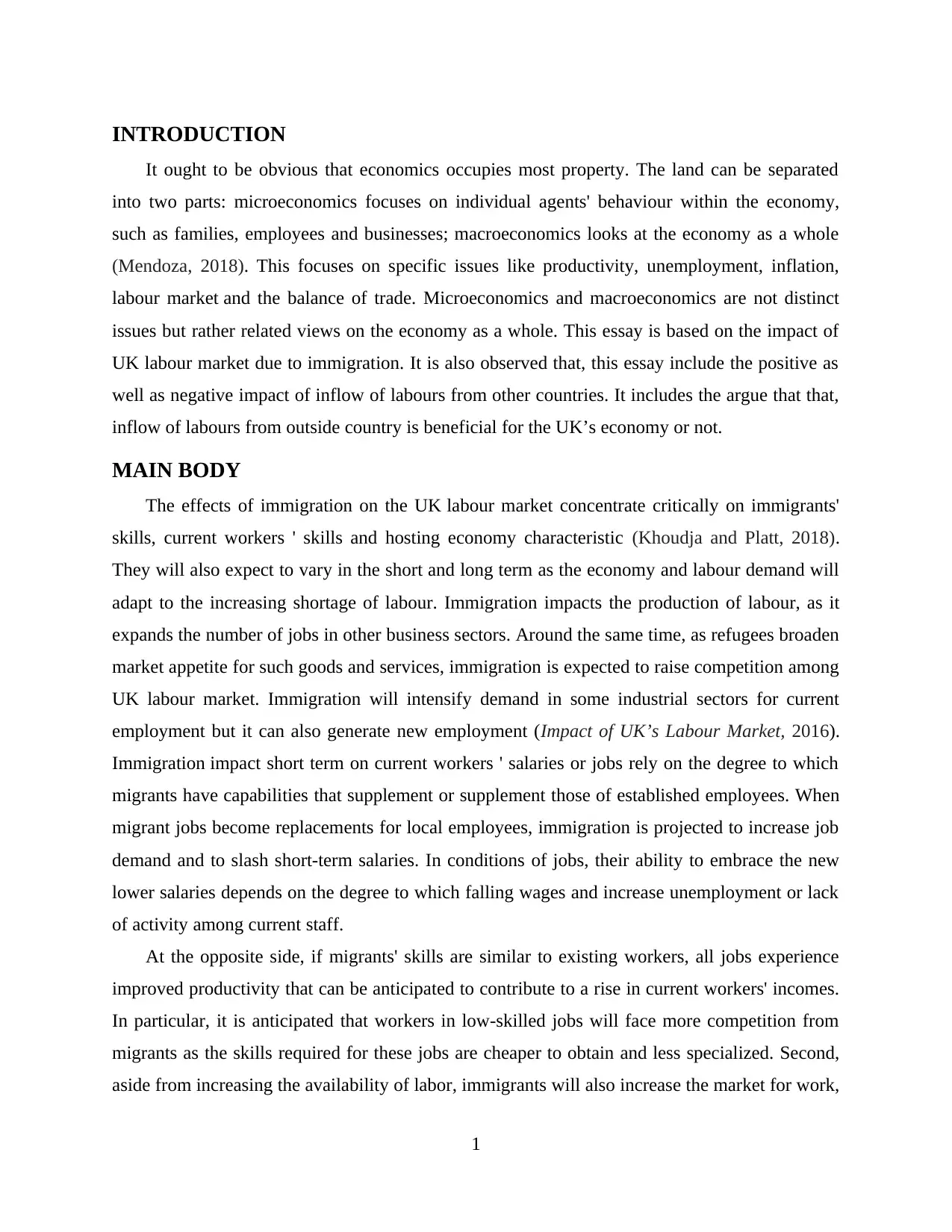
INTRODUCTION
It ought to be obvious that economics occupies most property. The land can be separated
into two parts: microeconomics focuses on individual agents' behaviour within the economy,
such as families, employees and businesses; macroeconomics looks at the economy as a whole
(Mendoza, 2018). This focuses on specific issues like productivity, unemployment, inflation,
labour market and the balance of trade. Microeconomics and macroeconomics are not distinct
issues but rather related views on the economy as a whole. This essay is based on the impact of
UK labour market due to immigration. It is also observed that, this essay include the positive as
well as negative impact of inflow of labours from other countries. It includes the argue that that,
inflow of labours from outside country is beneficial for the UK’s economy or not.
MAIN BODY
The effects of immigration on the UK labour market concentrate critically on immigrants'
skills, current workers ' skills and hosting economy characteristic (Khoudja and Platt, 2018).
They will also expect to vary in the short and long term as the economy and labour demand will
adapt to the increasing shortage of labour. Immigration impacts the production of labour, as it
expands the number of jobs in other business sectors. Around the same time, as refugees broaden
market appetite for such goods and services, immigration is expected to raise competition among
UK labour market. Immigration will intensify demand in some industrial sectors for current
employment but it can also generate new employment (Impact of UK’s Labour Market, 2016).
Immigration impact short term on current workers ' salaries or jobs rely on the degree to which
migrants have capabilities that supplement or supplement those of established employees. When
migrant jobs become replacements for local employees, immigration is projected to increase job
demand and to slash short-term salaries. In conditions of jobs, their ability to embrace the new
lower salaries depends on the degree to which falling wages and increase unemployment or lack
of activity among current staff.
At the opposite side, if migrants' skills are similar to existing workers, all jobs experience
improved productivity that can be anticipated to contribute to a rise in current workers' incomes.
In particular, it is anticipated that workers in low-skilled jobs will face more competition from
migrants as the skills required for these jobs are cheaper to obtain and less specialized. Second,
aside from increasing the availability of labor, immigrants will also increase the market for work,
1
It ought to be obvious that economics occupies most property. The land can be separated
into two parts: microeconomics focuses on individual agents' behaviour within the economy,
such as families, employees and businesses; macroeconomics looks at the economy as a whole
(Mendoza, 2018). This focuses on specific issues like productivity, unemployment, inflation,
labour market and the balance of trade. Microeconomics and macroeconomics are not distinct
issues but rather related views on the economy as a whole. This essay is based on the impact of
UK labour market due to immigration. It is also observed that, this essay include the positive as
well as negative impact of inflow of labours from other countries. It includes the argue that that,
inflow of labours from outside country is beneficial for the UK’s economy or not.
MAIN BODY
The effects of immigration on the UK labour market concentrate critically on immigrants'
skills, current workers ' skills and hosting economy characteristic (Khoudja and Platt, 2018).
They will also expect to vary in the short and long term as the economy and labour demand will
adapt to the increasing shortage of labour. Immigration impacts the production of labour, as it
expands the number of jobs in other business sectors. Around the same time, as refugees broaden
market appetite for such goods and services, immigration is expected to raise competition among
UK labour market. Immigration will intensify demand in some industrial sectors for current
employment but it can also generate new employment (Impact of UK’s Labour Market, 2016).
Immigration impact short term on current workers ' salaries or jobs rely on the degree to which
migrants have capabilities that supplement or supplement those of established employees. When
migrant jobs become replacements for local employees, immigration is projected to increase job
demand and to slash short-term salaries. In conditions of jobs, their ability to embrace the new
lower salaries depends on the degree to which falling wages and increase unemployment or lack
of activity among current staff.
At the opposite side, if migrants' skills are similar to existing workers, all jobs experience
improved productivity that can be anticipated to contribute to a rise in current workers' incomes.
In particular, it is anticipated that workers in low-skilled jobs will face more competition from
migrants as the skills required for these jobs are cheaper to obtain and less specialized. Second,
aside from increasing the availability of labor, immigrants will also increase the market for work,
1
⊘ This is a preview!⊘
Do you want full access?
Subscribe today to unlock all pages.

Trusted by 1+ million students worldwide
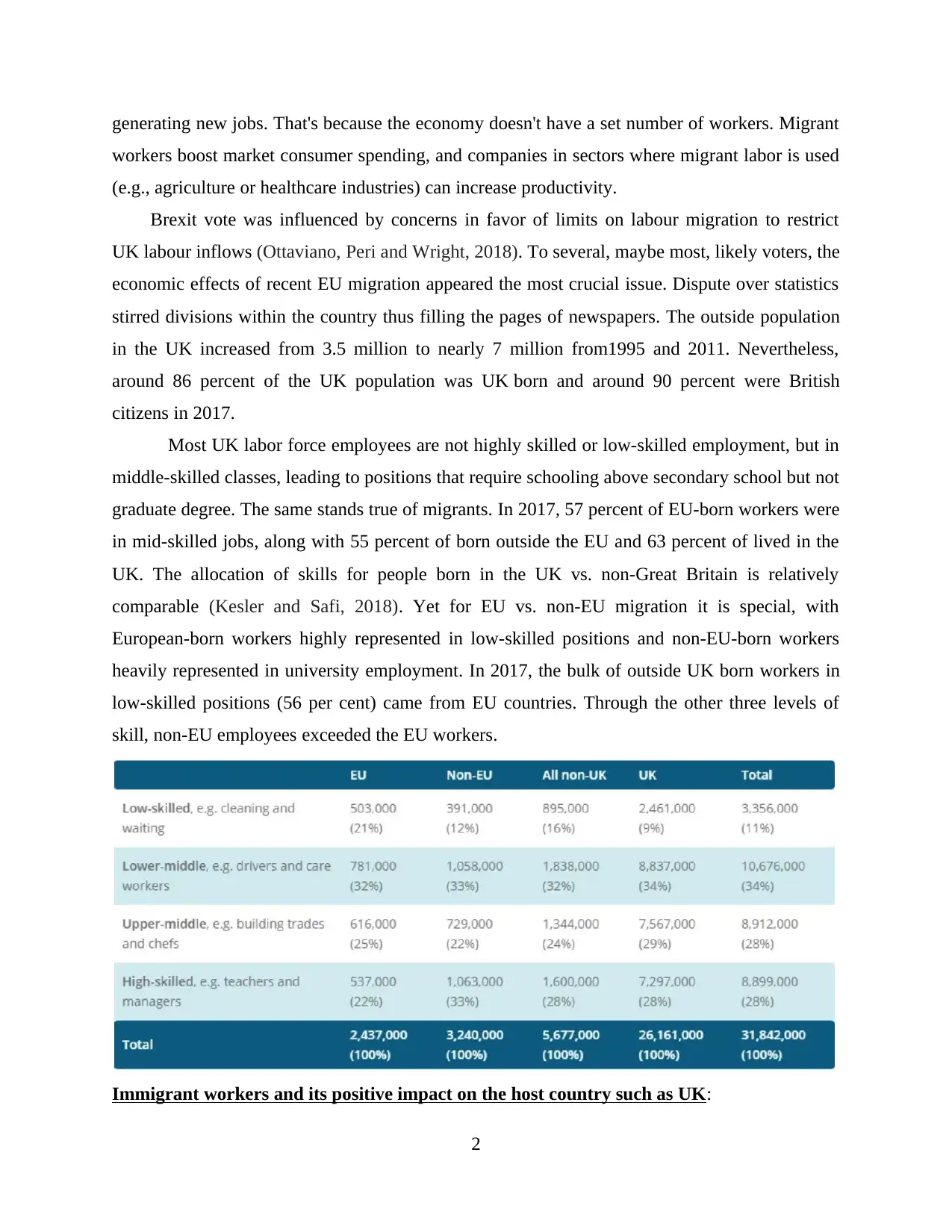
generating new jobs. That's because the economy doesn't have a set number of workers. Migrant
workers boost market consumer spending, and companies in sectors where migrant labor is used
(e.g., agriculture or healthcare industries) can increase productivity.
Brexit vote was influenced by concerns in favor of limits on labour migration to restrict
UK labour inflows (Ottaviano, Peri and Wright, 2018). To several, maybe most, likely voters, the
economic effects of recent EU migration appeared the most crucial issue. Dispute over statistics
stirred divisions within the country thus filling the pages of newspapers. The outside population
in the UK increased from 3.5 million to nearly 7 million from1995 and 2011. Nevertheless,
around 86 percent of the UK population was UK born and around 90 percent were British
citizens in 2017.
Most UK labor force employees are not highly skilled or low-skilled employment, but in
middle-skilled classes, leading to positions that require schooling above secondary school but not
graduate degree. The same stands true of migrants. In 2017, 57 percent of EU-born workers were
in mid-skilled jobs, along with 55 percent of born outside the EU and 63 percent of lived in the
UK. The allocation of skills for people born in the UK vs. non-Great Britain is relatively
comparable (Kesler and Safi, 2018). Yet for EU vs. non-EU migration it is special, with
European-born workers highly represented in low-skilled positions and non-EU-born workers
heavily represented in university employment. In 2017, the bulk of outside UK born workers in
low-skilled positions (56 per cent) came from EU countries. Through the other three levels of
skill, non-EU employees exceeded the EU workers.
Immigrant workers and its positive impact on the host country such as UK:
2
workers boost market consumer spending, and companies in sectors where migrant labor is used
(e.g., agriculture or healthcare industries) can increase productivity.
Brexit vote was influenced by concerns in favor of limits on labour migration to restrict
UK labour inflows (Ottaviano, Peri and Wright, 2018). To several, maybe most, likely voters, the
economic effects of recent EU migration appeared the most crucial issue. Dispute over statistics
stirred divisions within the country thus filling the pages of newspapers. The outside population
in the UK increased from 3.5 million to nearly 7 million from1995 and 2011. Nevertheless,
around 86 percent of the UK population was UK born and around 90 percent were British
citizens in 2017.
Most UK labor force employees are not highly skilled or low-skilled employment, but in
middle-skilled classes, leading to positions that require schooling above secondary school but not
graduate degree. The same stands true of migrants. In 2017, 57 percent of EU-born workers were
in mid-skilled jobs, along with 55 percent of born outside the EU and 63 percent of lived in the
UK. The allocation of skills for people born in the UK vs. non-Great Britain is relatively
comparable (Kesler and Safi, 2018). Yet for EU vs. non-EU migration it is special, with
European-born workers highly represented in low-skilled positions and non-EU-born workers
heavily represented in university employment. In 2017, the bulk of outside UK born workers in
low-skilled positions (56 per cent) came from EU countries. Through the other three levels of
skill, non-EU employees exceeded the EU workers.
Immigrant workers and its positive impact on the host country such as UK:
2
Paraphrase This Document
Need a fresh take? Get an instant paraphrase of this document with our AI Paraphraser
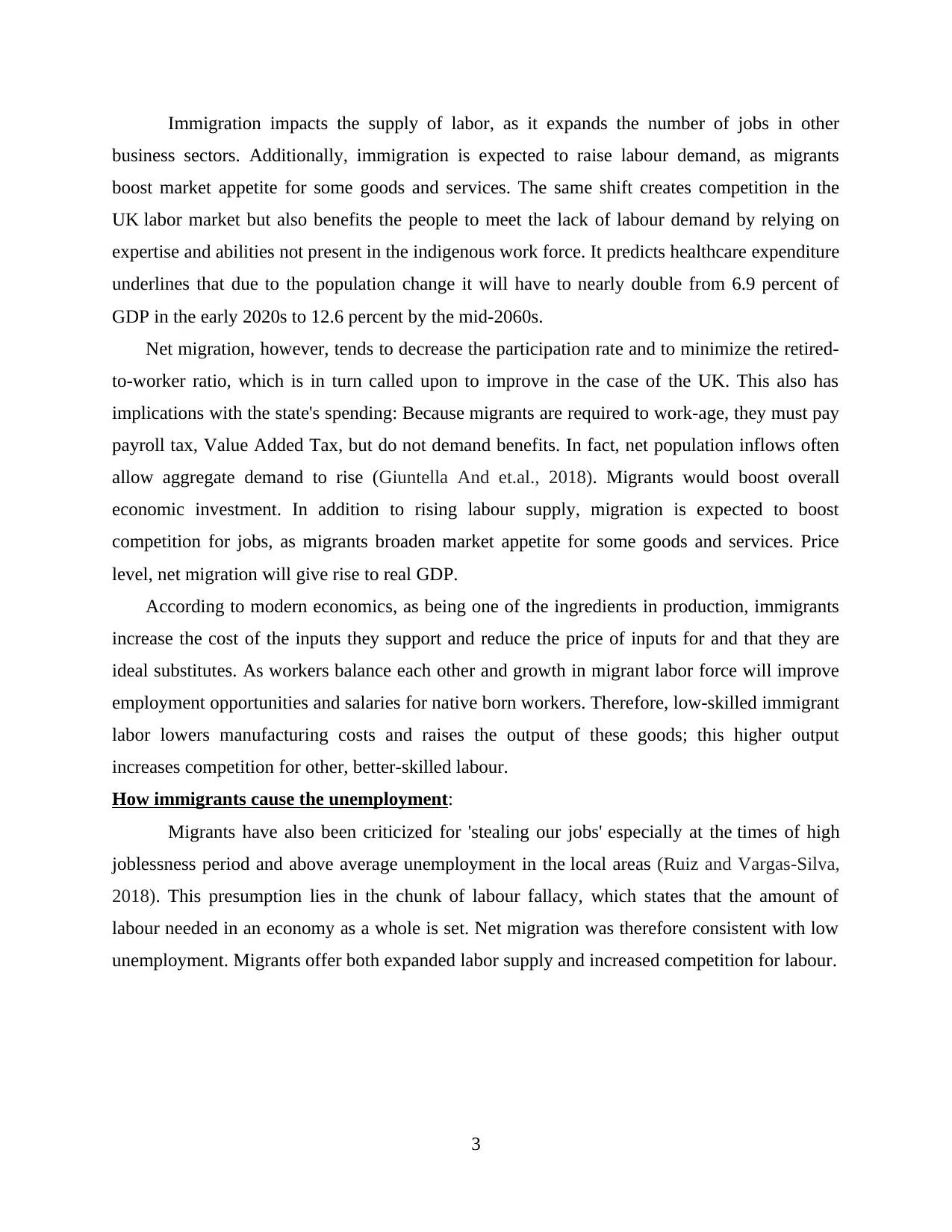
Immigration impacts the supply of labor, as it expands the number of jobs in other
business sectors. Additionally, immigration is expected to raise labour demand, as migrants
boost market appetite for some goods and services. The same shift creates competition in the
UK labor market but also benefits the people to meet the lack of labour demand by relying on
expertise and abilities not present in the indigenous work force. It predicts healthcare expenditure
underlines that due to the population change it will have to nearly double from 6.9 percent of
GDP in the early 2020s to 12.6 percent by the mid-2060s.
Net migration, however, tends to decrease the participation rate and to minimize the retired-
to-worker ratio, which is in turn called upon to improve in the case of the UK. This also has
implications with the state's spending: Because migrants are required to work-age, they must pay
payroll tax, Value Added Tax, but do not demand benefits. In fact, net population inflows often
allow aggregate demand to rise (Giuntella And et.al., 2018). Migrants would boost overall
economic investment. In addition to rising labour supply, migration is expected to boost
competition for jobs, as migrants broaden market appetite for some goods and services. Price
level, net migration will give rise to real GDP.
According to modern economics, as being one of the ingredients in production, immigrants
increase the cost of the inputs they support and reduce the price of inputs for and that they are
ideal substitutes. As workers balance each other and growth in migrant labor force will improve
employment opportunities and salaries for native born workers. Therefore, low-skilled immigrant
labor lowers manufacturing costs and raises the output of these goods; this higher output
increases competition for other, better-skilled labour.
How immigrants cause the unemployment:
Migrants have also been criticized for 'stealing our jobs' especially at the times of high
joblessness period and above average unemployment in the local areas (Ruiz and Vargas-Silva,
2018). This presumption lies in the chunk of labour fallacy, which states that the amount of
labour needed in an economy as a whole is set. Net migration was therefore consistent with low
unemployment. Migrants offer both expanded labor supply and increased competition for labour.
3
business sectors. Additionally, immigration is expected to raise labour demand, as migrants
boost market appetite for some goods and services. The same shift creates competition in the
UK labor market but also benefits the people to meet the lack of labour demand by relying on
expertise and abilities not present in the indigenous work force. It predicts healthcare expenditure
underlines that due to the population change it will have to nearly double from 6.9 percent of
GDP in the early 2020s to 12.6 percent by the mid-2060s.
Net migration, however, tends to decrease the participation rate and to minimize the retired-
to-worker ratio, which is in turn called upon to improve in the case of the UK. This also has
implications with the state's spending: Because migrants are required to work-age, they must pay
payroll tax, Value Added Tax, but do not demand benefits. In fact, net population inflows often
allow aggregate demand to rise (Giuntella And et.al., 2018). Migrants would boost overall
economic investment. In addition to rising labour supply, migration is expected to boost
competition for jobs, as migrants broaden market appetite for some goods and services. Price
level, net migration will give rise to real GDP.
According to modern economics, as being one of the ingredients in production, immigrants
increase the cost of the inputs they support and reduce the price of inputs for and that they are
ideal substitutes. As workers balance each other and growth in migrant labor force will improve
employment opportunities and salaries for native born workers. Therefore, low-skilled immigrant
labor lowers manufacturing costs and raises the output of these goods; this higher output
increases competition for other, better-skilled labour.
How immigrants cause the unemployment:
Migrants have also been criticized for 'stealing our jobs' especially at the times of high
joblessness period and above average unemployment in the local areas (Ruiz and Vargas-Silva,
2018). This presumption lies in the chunk of labour fallacy, which states that the amount of
labour needed in an economy as a whole is set. Net migration was therefore consistent with low
unemployment. Migrants offer both expanded labor supply and increased competition for labour.
3
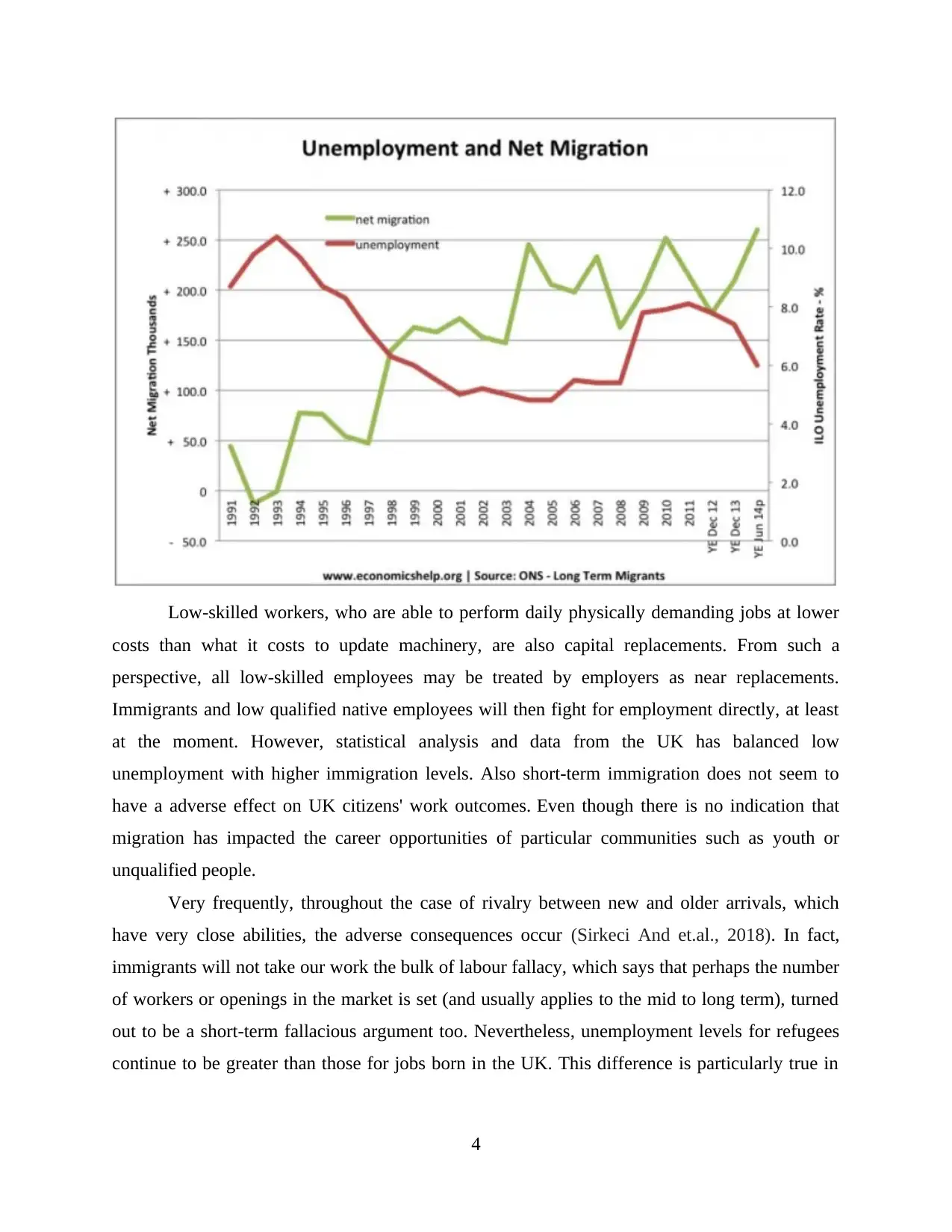
Low-skilled workers, who are able to perform daily physically demanding jobs at lower
costs than what it costs to update machinery, are also capital replacements. From such a
perspective, all low-skilled employees may be treated by employers as near replacements.
Immigrants and low qualified native employees will then fight for employment directly, at least
at the moment. However, statistical analysis and data from the UK has balanced low
unemployment with higher immigration levels. Also short-term immigration does not seem to
have a adverse effect on UK citizens' work outcomes. Even though there is no indication that
migration has impacted the career opportunities of particular communities such as youth or
unqualified people.
Very frequently, throughout the case of rivalry between new and older arrivals, which
have very close abilities, the adverse consequences occur (Sirkeci And et.al., 2018). In fact,
immigrants will not take our work the bulk of labour fallacy, which says that perhaps the number
of workers or openings in the market is set (and usually applies to the mid to long term), turned
out to be a short-term fallacious argument too. Nevertheless, unemployment levels for refugees
continue to be greater than those for jobs born in the UK. This difference is particularly true in
4
costs than what it costs to update machinery, are also capital replacements. From such a
perspective, all low-skilled employees may be treated by employers as near replacements.
Immigrants and low qualified native employees will then fight for employment directly, at least
at the moment. However, statistical analysis and data from the UK has balanced low
unemployment with higher immigration levels. Also short-term immigration does not seem to
have a adverse effect on UK citizens' work outcomes. Even though there is no indication that
migration has impacted the career opportunities of particular communities such as youth or
unqualified people.
Very frequently, throughout the case of rivalry between new and older arrivals, which
have very close abilities, the adverse consequences occur (Sirkeci And et.al., 2018). In fact,
immigrants will not take our work the bulk of labour fallacy, which says that perhaps the number
of workers or openings in the market is set (and usually applies to the mid to long term), turned
out to be a short-term fallacious argument too. Nevertheless, unemployment levels for refugees
continue to be greater than those for jobs born in the UK. This difference is particularly true in
4
⊘ This is a preview!⊘
Do you want full access?
Subscribe today to unlock all pages.

Trusted by 1+ million students worldwide
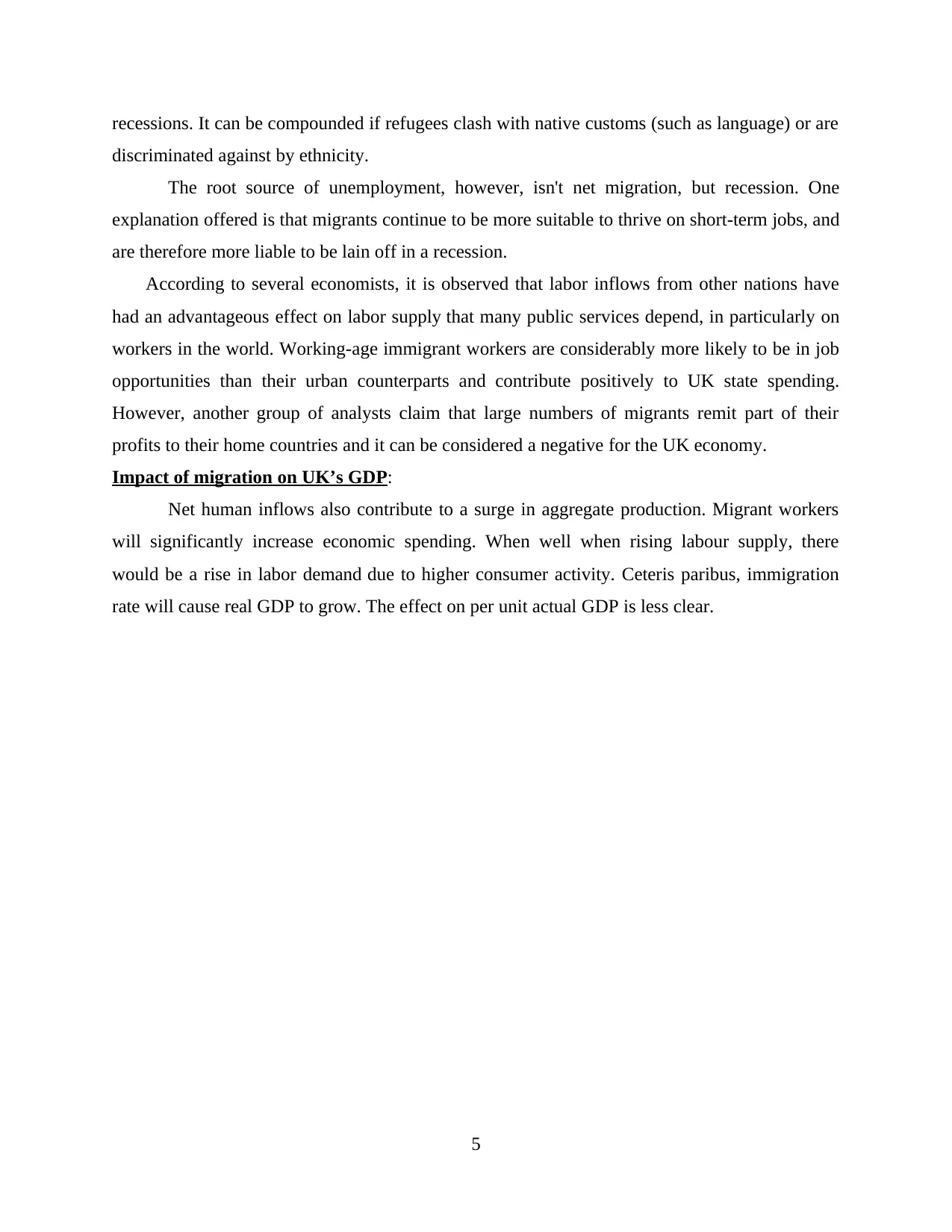
recessions. It can be compounded if refugees clash with native customs (such as language) or are
discriminated against by ethnicity.
The root source of unemployment, however, isn't net migration, but recession. One
explanation offered is that migrants continue to be more suitable to thrive on short-term jobs, and
are therefore more liable to be lain off in a recession.
According to several economists, it is observed that labor inflows from other nations have
had an advantageous effect on labor supply that many public services depend, in particularly on
workers in the world. Working-age immigrant workers are considerably more likely to be in job
opportunities than their urban counterparts and contribute positively to UK state spending.
However, another group of analysts claim that large numbers of migrants remit part of their
profits to their home countries and it can be considered a negative for the UK economy.
Impact of migration on UK’s GDP:
Net human inflows also contribute to a surge in aggregate production. Migrant workers
will significantly increase economic spending. When well when rising labour supply, there
would be a rise in labor demand due to higher consumer activity. Ceteris paribus, immigration
rate will cause real GDP to grow. The effect on per unit actual GDP is less clear.
5
discriminated against by ethnicity.
The root source of unemployment, however, isn't net migration, but recession. One
explanation offered is that migrants continue to be more suitable to thrive on short-term jobs, and
are therefore more liable to be lain off in a recession.
According to several economists, it is observed that labor inflows from other nations have
had an advantageous effect on labor supply that many public services depend, in particularly on
workers in the world. Working-age immigrant workers are considerably more likely to be in job
opportunities than their urban counterparts and contribute positively to UK state spending.
However, another group of analysts claim that large numbers of migrants remit part of their
profits to their home countries and it can be considered a negative for the UK economy.
Impact of migration on UK’s GDP:
Net human inflows also contribute to a surge in aggregate production. Migrant workers
will significantly increase economic spending. When well when rising labour supply, there
would be a rise in labor demand due to higher consumer activity. Ceteris paribus, immigration
rate will cause real GDP to grow. The effect on per unit actual GDP is less clear.
5
Paraphrase This Document
Need a fresh take? Get an instant paraphrase of this document with our AI Paraphraser
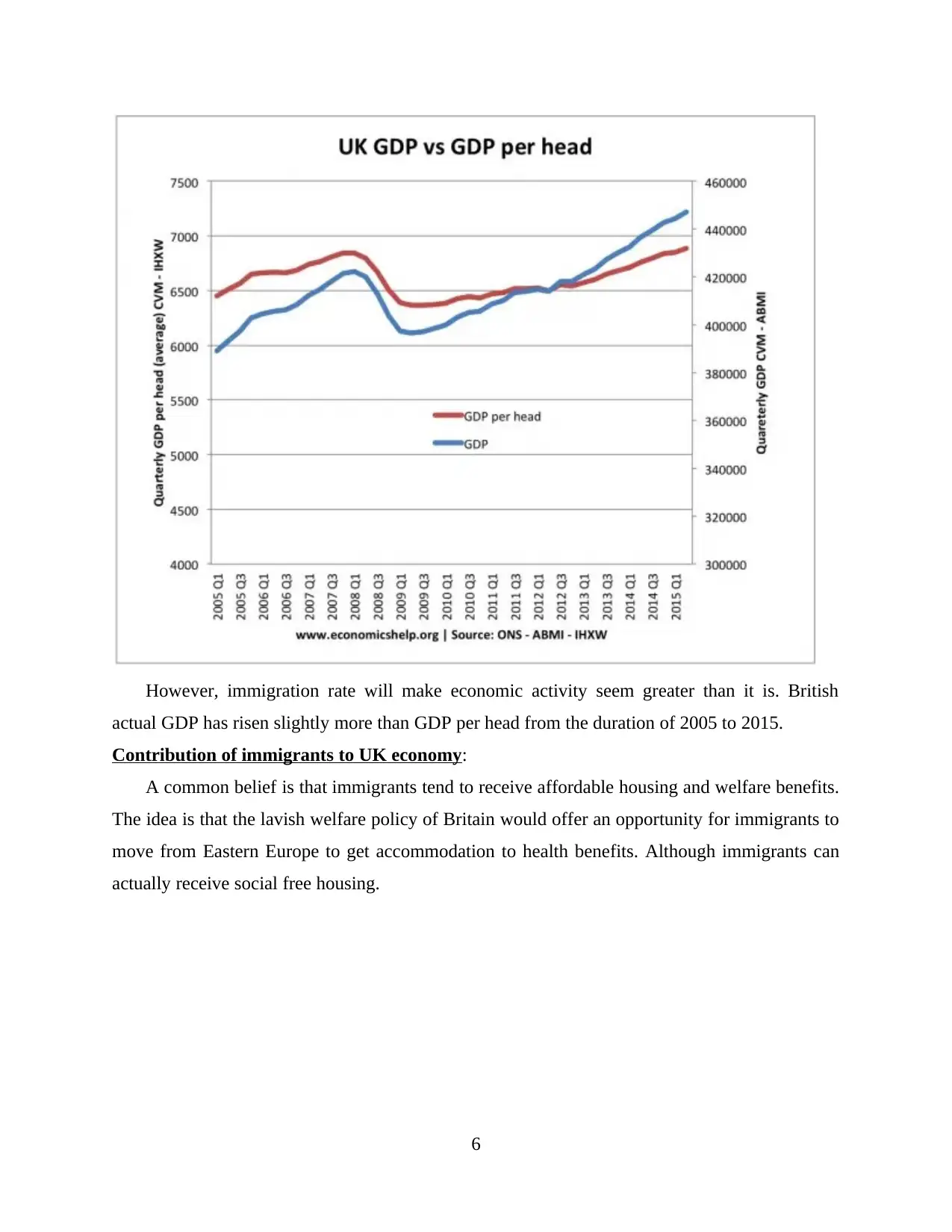
However, immigration rate will make economic activity seem greater than it is. British
actual GDP has risen slightly more than GDP per head from the duration of 2005 to 2015.
Contribution of immigrants to UK economy:
A common belief is that immigrants tend to receive affordable housing and welfare benefits.
The idea is that the lavish welfare policy of Britain would offer an opportunity for immigrants to
move from Eastern Europe to get accommodation to health benefits. Although immigrants can
actually receive social free housing.
6
actual GDP has risen slightly more than GDP per head from the duration of 2005 to 2015.
Contribution of immigrants to UK economy:
A common belief is that immigrants tend to receive affordable housing and welfare benefits.
The idea is that the lavish welfare policy of Britain would offer an opportunity for immigrants to
move from Eastern Europe to get accommodation to health benefits. Although immigrants can
actually receive social free housing.
6
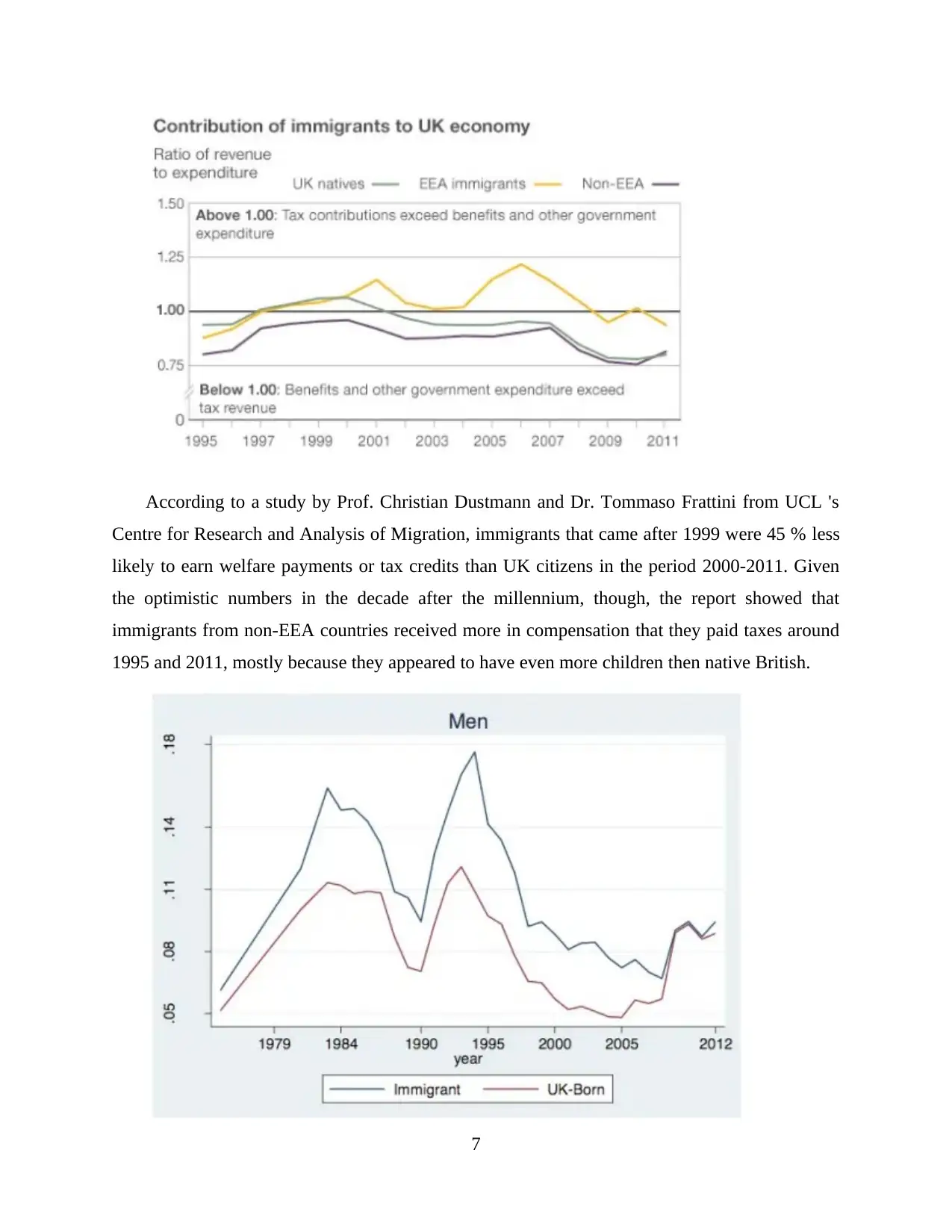
According to a study by Prof. Christian Dustmann and Dr. Tommaso Frattini from UCL 's
Centre for Research and Analysis of Migration, immigrants that came after 1999 were 45 % less
likely to earn welfare payments or tax credits than UK citizens in the period 2000-2011. Given
the optimistic numbers in the decade after the millennium, though, the report showed that
immigrants from non-EEA countries received more in compensation that they paid taxes around
1995 and 2011, mostly because they appeared to have even more children then native British.
7
Centre for Research and Analysis of Migration, immigrants that came after 1999 were 45 % less
likely to earn welfare payments or tax credits than UK citizens in the period 2000-2011. Given
the optimistic numbers in the decade after the millennium, though, the report showed that
immigrants from non-EEA countries received more in compensation that they paid taxes around
1995 and 2011, mostly because they appeared to have even more children then native British.
7
⊘ This is a preview!⊘
Do you want full access?
Subscribe today to unlock all pages.

Trusted by 1+ million students worldwide
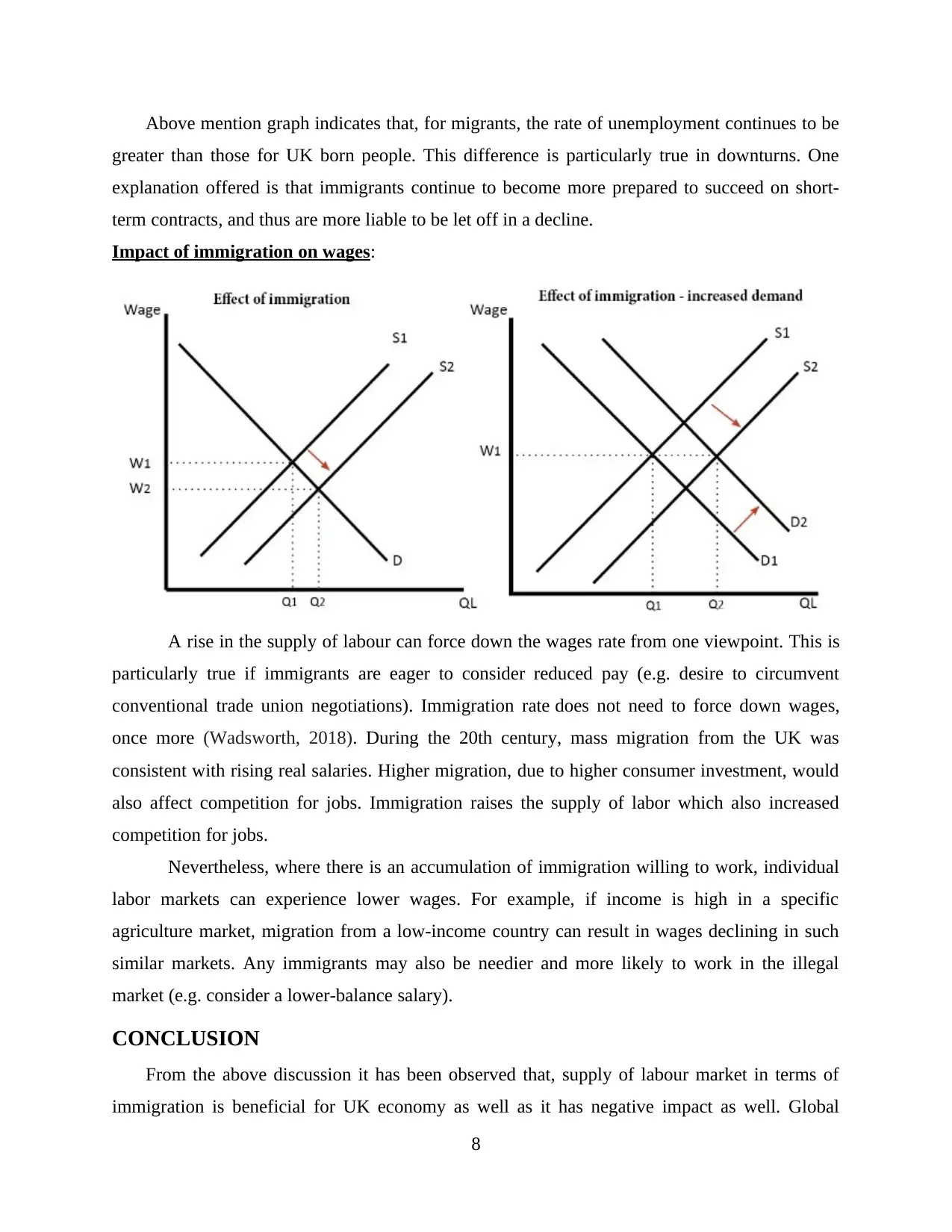
Above mention graph indicates that, for migrants, the rate of unemployment continues to be
greater than those for UK born people. This difference is particularly true in downturns. One
explanation offered is that immigrants continue to become more prepared to succeed on short-
term contracts, and thus are more liable to be let off in a decline.
Impact of immigration on wages:
A rise in the supply of labour can force down the wages rate from one viewpoint. This is
particularly true if immigrants are eager to consider reduced pay (e.g. desire to circumvent
conventional trade union negotiations). Immigration rate does not need to force down wages,
once more (Wadsworth, 2018). During the 20th century, mass migration from the UK was
consistent with rising real salaries. Higher migration, due to higher consumer investment, would
also affect competition for jobs. Immigration raises the supply of labor which also increased
competition for jobs.
Nevertheless, where there is an accumulation of immigration willing to work, individual
labor markets can experience lower wages. For example, if income is high in a specific
agriculture market, migration from a low-income country can result in wages declining in such
similar markets. Any immigrants may also be needier and more likely to work in the illegal
market (e.g. consider a lower-balance salary).
CONCLUSION
From the above discussion it has been observed that, supply of labour market in terms of
immigration is beneficial for UK economy as well as it has negative impact as well. Global
8
greater than those for UK born people. This difference is particularly true in downturns. One
explanation offered is that immigrants continue to become more prepared to succeed on short-
term contracts, and thus are more liable to be let off in a decline.
Impact of immigration on wages:
A rise in the supply of labour can force down the wages rate from one viewpoint. This is
particularly true if immigrants are eager to consider reduced pay (e.g. desire to circumvent
conventional trade union negotiations). Immigration rate does not need to force down wages,
once more (Wadsworth, 2018). During the 20th century, mass migration from the UK was
consistent with rising real salaries. Higher migration, due to higher consumer investment, would
also affect competition for jobs. Immigration raises the supply of labor which also increased
competition for jobs.
Nevertheless, where there is an accumulation of immigration willing to work, individual
labor markets can experience lower wages. For example, if income is high in a specific
agriculture market, migration from a low-income country can result in wages declining in such
similar markets. Any immigrants may also be needier and more likely to work in the illegal
market (e.g. consider a lower-balance salary).
CONCLUSION
From the above discussion it has been observed that, supply of labour market in terms of
immigration is beneficial for UK economy as well as it has negative impact as well. Global
8
Paraphrase This Document
Need a fresh take? Get an instant paraphrase of this document with our AI Paraphraser
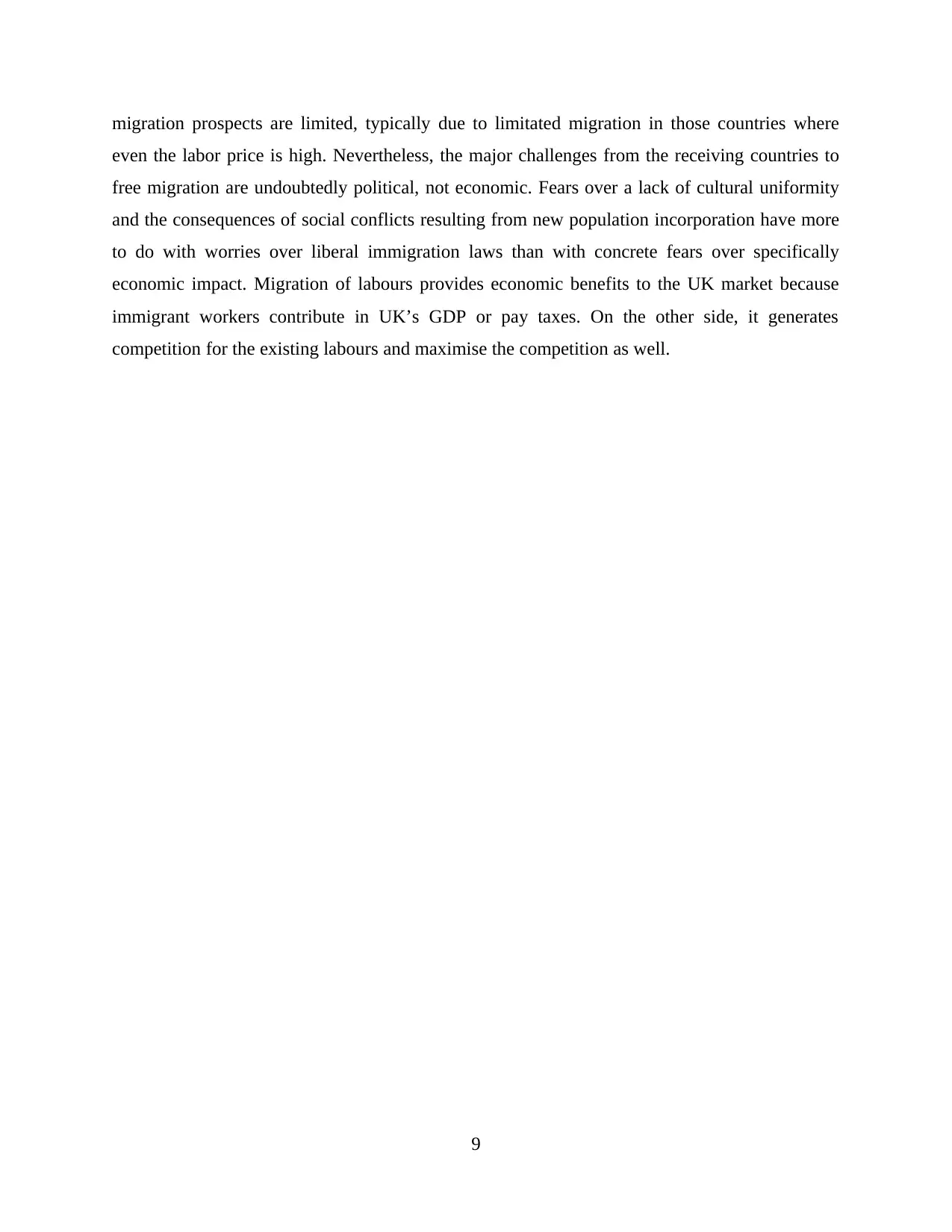
migration prospects are limited, typically due to limitated migration in those countries where
even the labor price is high. Nevertheless, the major challenges from the receiving countries to
free migration are undoubtedly political, not economic. Fears over a lack of cultural uniformity
and the consequences of social conflicts resulting from new population incorporation have more
to do with worries over liberal immigration laws than with concrete fears over specifically
economic impact. Migration of labours provides economic benefits to the UK market because
immigrant workers contribute in UK’s GDP or pay taxes. On the other side, it generates
competition for the existing labours and maximise the competition as well.
9
even the labor price is high. Nevertheless, the major challenges from the receiving countries to
free migration are undoubtedly political, not economic. Fears over a lack of cultural uniformity
and the consequences of social conflicts resulting from new population incorporation have more
to do with worries over liberal immigration laws than with concrete fears over specifically
economic impact. Migration of labours provides economic benefits to the UK market because
immigrant workers contribute in UK’s GDP or pay taxes. On the other side, it generates
competition for the existing labours and maximise the competition as well.
9
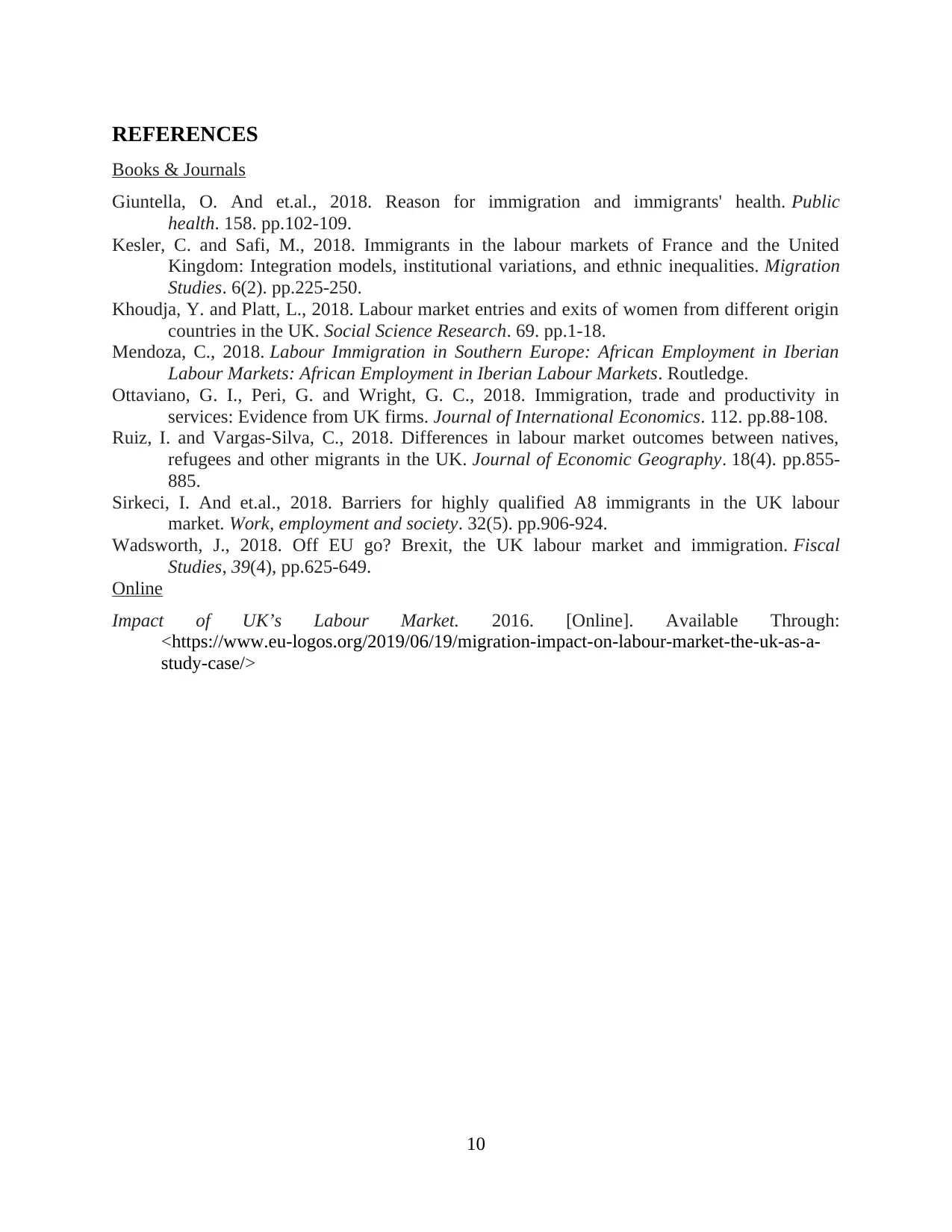
REFERENCES
Books & Journals
Giuntella, O. And et.al., 2018. Reason for immigration and immigrants' health. Public
health. 158. pp.102-109.
Kesler, C. and Safi, M., 2018. Immigrants in the labour markets of France and the United
Kingdom: Integration models, institutional variations, and ethnic inequalities. Migration
Studies. 6(2). pp.225-250.
Khoudja, Y. and Platt, L., 2018. Labour market entries and exits of women from different origin
countries in the UK. Social Science Research. 69. pp.1-18.
Mendoza, C., 2018. Labour Immigration in Southern Europe: African Employment in Iberian
Labour Markets: African Employment in Iberian Labour Markets. Routledge.
Ottaviano, G. I., Peri, G. and Wright, G. C., 2018. Immigration, trade and productivity in
services: Evidence from UK firms. Journal of International Economics. 112. pp.88-108.
Ruiz, I. and Vargas-Silva, C., 2018. Differences in labour market outcomes between natives,
refugees and other migrants in the UK. Journal of Economic Geography. 18(4). pp.855-
885.
Sirkeci, I. And et.al., 2018. Barriers for highly qualified A8 immigrants in the UK labour
market. Work, employment and society. 32(5). pp.906-924.
Wadsworth, J., 2018. Off EU go? Brexit, the UK labour market and immigration. Fiscal
Studies, 39(4), pp.625-649.
Online
Impact of UK’s Labour Market. 2016. [Online]. Available Through:
<https://www.eu-logos.org/2019/06/19/migration-impact-on-labour-market-the-uk-as-a-
study-case/>
10
Books & Journals
Giuntella, O. And et.al., 2018. Reason for immigration and immigrants' health. Public
health. 158. pp.102-109.
Kesler, C. and Safi, M., 2018. Immigrants in the labour markets of France and the United
Kingdom: Integration models, institutional variations, and ethnic inequalities. Migration
Studies. 6(2). pp.225-250.
Khoudja, Y. and Platt, L., 2018. Labour market entries and exits of women from different origin
countries in the UK. Social Science Research. 69. pp.1-18.
Mendoza, C., 2018. Labour Immigration in Southern Europe: African Employment in Iberian
Labour Markets: African Employment in Iberian Labour Markets. Routledge.
Ottaviano, G. I., Peri, G. and Wright, G. C., 2018. Immigration, trade and productivity in
services: Evidence from UK firms. Journal of International Economics. 112. pp.88-108.
Ruiz, I. and Vargas-Silva, C., 2018. Differences in labour market outcomes between natives,
refugees and other migrants in the UK. Journal of Economic Geography. 18(4). pp.855-
885.
Sirkeci, I. And et.al., 2018. Barriers for highly qualified A8 immigrants in the UK labour
market. Work, employment and society. 32(5). pp.906-924.
Wadsworth, J., 2018. Off EU go? Brexit, the UK labour market and immigration. Fiscal
Studies, 39(4), pp.625-649.
Online
Impact of UK’s Labour Market. 2016. [Online]. Available Through:
<https://www.eu-logos.org/2019/06/19/migration-impact-on-labour-market-the-uk-as-a-
study-case/>
10
⊘ This is a preview!⊘
Do you want full access?
Subscribe today to unlock all pages.

Trusted by 1+ million students worldwide
1 out of 12
Related Documents
Your All-in-One AI-Powered Toolkit for Academic Success.
+13062052269
info@desklib.com
Available 24*7 on WhatsApp / Email
![[object Object]](/_next/static/media/star-bottom.7253800d.svg)
Unlock your academic potential
Copyright © 2020–2026 A2Z Services. All Rights Reserved. Developed and managed by ZUCOL.





